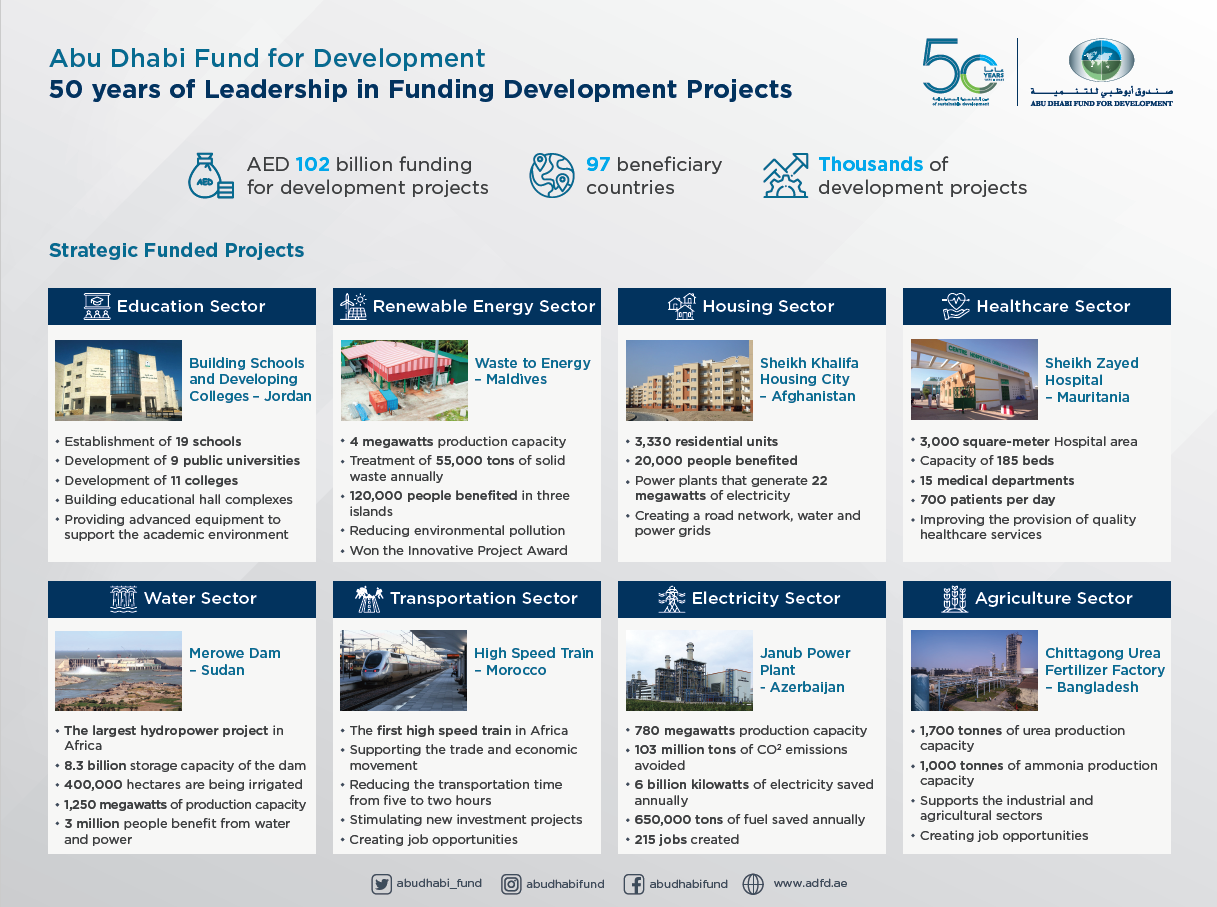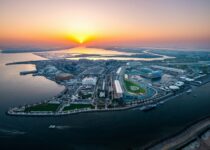Abu Dhabi Fund for Development (ADFD), since its establishment in 1971, has financed thousands of development projects that significantly impacted millions of lives in 97 developing countries around the world.
The projects have contributed to advancing economic growth, improving access to healthcare and education, and building modern infrastructure, including road, railway and water networks as well as airports and housing projects. They also supported innovation and adoption of advanced technology in renewable energy and other sectors, said an ADFD press release issued on Tuesday on the occasion of its 50th anniversary.
Amounting to AED102 billion to date, ADFD’s development finance, including provision of concessional loans and government grants, became a unique model of supporting developing countries in overcoming challenges while strengthening economic partnerships.
Despite the global economic downturn due to the COVID-19 pandemic, the Fund contributed to financing 12 development projects in 2020 with a total value of AED2.8 billion, benefiting 10 developing countries. The support focused on crucial sectors, including renewable energy, transport, housing, healthcare and agriculture.
Mohammed Saif Al Suwaidi, Director-General of ADFD, said, “We attribute the success of ADFD’s efforts to the unwavering support of our wise leadership that has enabled the Fund to rise to a prominent position among the most prestigious international development organisations.”
He added, “Over the course of its development journey, ADFD has gained extensive experience in development and investment activities and built strategic partnerships with a host of regional and global financial institutions. During the past five decades, it has marked multiple pioneering accomplishments in the UAE and in developing countries that have advanced the UN’s Sustainable Development Goals (SDGs), improved millions of lives and created new job opportunities.”
Al Suwaidi concluded, “As we approach the 50th anniversary of the establishment of the UAE, we look forward to implementing innovative development programmes and plans that will bolster ADFD’s global positioning while achieving new milestones in sustainable development, and increasing efficiencies in financing and investing in key economic sectors.”
ADFD-funded projects in developing countries focus on vital sectors, including education, healthcare, transportation, mobility, energy, agriculture, irrigation, housing and infrastructure. The Fund prioritizes the financing of development projects that have a direct impact on people’s lives and livelihoods.
The following is an overview of the most prominent projects financed by ADFD in various sectors: Water and Irrigation ADFD has contributed to financing hundreds of development projects in the water and irrigation sector. Those projects have improved living standards through building dams and irrigation networks that played a major role in expanding irrigated agricultural areas and strengthening food security, in addition to driving sustainable development in this vital sector. The most noteworthy projects funded by ADFD in this sector include: Merowe Dam – Sudan ADFD contributed AED734 million to the construction of the Merowe Dam in Sudan, one of the largest hydroelectric projects in Africa that generates renewable energy to provide electricity to more than 90 percent of the population in surrounding areas. The project also became an important factor in developing local industry, especially food-processing facilities, improving the quality of agricultural production and enhancing living standards through irrigation of the 400 Hectares of Lands. After the dam was completed, electricity generation doubled, thus reducing dependence on traditional energy sources, while agricultural lands grew from 10 to 207 square kilometres. The dam produces 1,250 megawatts of hydroelectric power, benefiting more than three million people.
Kufranjah Dam – Jordan The Kufranjah Dam, a pioneering project funded by ADFD in Jordan at the cost of AED103 million, enhanced the available water resources for irrigation and drinking while developing the agricultural ecosystem around the town of Ajloun and helping combat desertification the region was suffering from. With a storage capacity of 7.8 million cubic meters, the dam caters to the needs of over 180,000 people and supports agricultural production through supplying water to irrigate more than 26,000 hectares of land. Furthermore, it safeguards the environment and provides job opportunities for the region’s population.
Water Network Development – Argentina As part of its efforts to provide clean water sources to developing countries, ADFD has contributed to the financing of a water network development project in the province of Santa Fe, Argentina, worth AED294 million. The project has had a positive impact on society through providing a reliable water supply to various regions of the country and improving water quality.
Samandini Dam – Burkina Faso ADFD’s AED37 million contribution to the financing of the Samandini Dam in Burkina Faso aims to support agricultural production, energy generation and sustainable development in rural areas, and boost food security.
The scope involved building a 2,900-meter-long and 23.9-meter-high dam with a storage capacity of around one billion cubic meters, a 2.9-megawatt power plant and irrigation networks to reclaim 1,500 hectares of agricultural land. The project has helped strengthen food security by increasing production to 250,000 tons of rice and other grains and 150,000 tons of fruits and vegetables annually, in addition to creating thousands of jobs.
Metolong Dam – Lesotho In 2012, ADFD allocated AED77 million for the financing of the Metolong Dam project with the aim of improving people’s lives through providing a sustainable water supply. The dam has enhanced the water resources in the capital Maseru and surrounding towns and villages and helps meet expected demand until 2025. The project also provides electricity to more than 80 villages, which has improved opportunities for sustainable development in various sectors.
Education ADFD focuses on financing educational projects, since this sector plays a key role in developing societies and is directly related to other socio-economic sectors. The Fund has helped establish educational centres, and build universities, schools and vocational training institutes featuring the latest equipment to enhance the quality of education. Some of the projects funded by ADFD in this sector include: Schools, Universities and Colleges – Jordan ADFD financed projects to establish 19 schools in different regions of Jordan, equipped with the latest science laboratories and computers to meet the needs of a growing number of students. In the field of higher education, the Fund helped build universities, community colleges, laboratories and other facilities, and financed a project to develop technological education in community colleges.
Vocational Training Institutes – Morocco ADFD contributed AED168 million to building and developing 22 vocational training institutes in Moroccan cities. These include 13 multidisciplinary institutes, four logistics and transportation institutes in Taourirt, Casablanca, Tangier and Agadir, an institute specializing in aeronautic engineering and airport logistics, two logistics services institutes in Fez and Oujda, and two food industry institutes in Meknes and Figuig.
Educational programmes for Children – Palestine In coordination with the Ministry of Foreign Affairs and International Cooperation (MoFAIC), ADFD funded an AED42 million grant to the United Nations Relief and Works Agency for Palestine Refugees in the Near East (UNRWA) to support its development plan that facilitates access to education for children of Palestinian refugees. The grant has enabled around 15,000 refugee children in 14 schools in Gaza to receive basic education by providing educational tools and creating an environment to help them continue their studies.
Renewable Energy ADFD actively participates in advancing the deployment of renewable energy around the world, considering its vital role in providing electricity at competitive prices and driving sustainable development. The Fund helped finance 90 solar, wind, hydro and thermal power projects in 65 countries with a combined capacity of more than 9,000 megawatts.
Some of the projects funded by ADFD include: Waste-to-Energy Facility – Maldives ADFD contributed AED22 million to an innovative waste-to-energy project in the Maldives that generates four megawatts of renewable energy by burning waste to reduce reliance on imported fuel. Providing a sustainable way to reduce environmental pollution and the accumulation of waste, the facility processes 55,000 tons of solid waste annually, desalinates more than 500,000 litres of drinking water, and provides electricity to 120,000 people on three islands in the Maldives.
Sheikh Zayed Solar Power Complex – Jordan The Sheikh Zayed Solar Power Complex is one of the top strategic projects funded by ADFD in Jordan at the cost of AED550 million (US$150 million). The facility generates 105 megawatts of power to provide electricity to southern areas of the country using solar photovoltaic panels. The project provides 50,000 houses of electricity. It supports the country’s economy, meets the growing electricity demand, reduces reliance on imported energy, decreases the costs of imported oil derivatives and cuts down on harmful carbon emissions.
Solar Power Project – Cuba ADFD supported the construction of four solar power plants in four Cuban provinces with a combined capacity of 15 megawatts. Supporting the Cuban government’s strategy to meet 24% of the country’s electricity needs from renewable sources by 2030, the project provides a stable energy supply to 7,000 homes from a renewable source, in addition to creating new jobs and protecting the environment.
Solar Power Plant – Somalia ADFD funded the construction of a seven-megawatt solar power plant in Somalia at the cost of AED29.3 million that helps meet the growing electricity demand of the 50,000 people living in the city of Berbera.
Transportation Transportation plays a key role in sustainable development, especially in developing countries. Modern transportation networks facilitate the movement of passengers and goods, and boost the economy and trade. Given the importance of the sector, ADFD funded multiple development and modernisation projects, including the construction and renovation of airports, ports, railways and road networks, which helped establish safe and advanced transportation networks in many developing countries.
Bahrain International Airport – Bahrain One of the pioneering projects financed by the Fund is the expansion of Bahrain International Airport with a total value of AED3.7 billion. Aimed at accommodating the growing numbers of travellers, the project increased the airport’s capacity to 14 million annually through building a new passenger terminal with a total area of 177,000 square meters. The airport also included support systems for ground services, essential facilities and infrastructure, a new air cargo area and aircraft maintenance hangars. The expansion has helped stimulate the growth of economic sectors such as transportation, tourism, trade and services.
Kidahwe-Uvinza Road – Tanzania ADFD allocated AED169 million for the financing of the Kidahwe-Uvinza road project in the rural areas of northwest Tanzania that has played an important role in developing the transport infrastructure in the region, improving the efficiency of the domestic road network, linking villages to major cities and ensuring improved access to public services. The project benefited more than two million people and contributed to supporting the local economy and international trade, and raising the standard of living. The scope included the construction of a 51-kilometre road linking the Kidahwe area to Uvinza and Kigoma, in addition to several small bridges that enable the passage of water in the valleys.
High-Speed Train Project – Morocco ADFD supported the construction of Africa’s first high-speed railway line in Morocco with a total value of AED514 million with the aim of accelerating the movement of goods and passengers between two main trade hubs in Morocco – Tangier and Casablanca. Reducing the travel time from four hours to two hours, the project marked a qualitative leap in the development of the transport sector, stimulated commercial, investment and tourism activity, and created new job opportunities.
Kulyab-Kalaikhumb Road – Tajikistan ADFD allocated AED55 million for the construction of the Kulyab-Kalaikhumb road in Tajikistan, an important strategic project that has advanced the development of the country’s transportation sector and promotes economic growth through linking the country’s capital Dushanbe in the west with major cities in the east as well as with international roads.
Velana International Airport – Maldives ADFD contributed AED184 million to financing the expansion project of the Velana International Airport on Hulhulé Island with the aim of supporting the tourism sector through accommodating the growing number of travellers to the Maldives and improving tourism services, which helps drive socio-economic development in the country. The project included the construction of a 3,400-meter runway with a breakwater and aprons, as well as the development of the west passenger terminal to increase its capacity to 26 gates.
Housing The provision of adequate accommodation for middle- and low-income segments of society is an important factor in improving living conditions, as housing is a basic human need and a pre-requisite for individual growth that helps people achieve stability and mitigate challenges they face in their daily lives. Therefore, ADFD has supported the development of thousands of housing units in urban and rural areas that have benefited millions of people around the world. The Fund focuses on integrated housing projects for sustainable communities.
Sheikh Zayed City – Egypt ADFD contributed to the financing of multiple rural and urban housing projects in Egypt, which reduce the burdens caused by rapid urbanisation while improving quality of life. These projects include Sheikh Zayed City in Cairo, one of the largest housing projects in Egypt covering an area of 10,000 hectares. The Fund financed 21 projects in Sheikh Zayed City including the construction of a 200-bed hospital with all modern medical specialties such Nuclear Radiation Therapy, in addition to key public facilities and service buildings including two mosques, a secondary school for both girls and boys, an industrial and a commercial secondary school, five primary education schools and two institutes.
Furthermore, the project comprises some ancillary facilities such as an irrigation water network and an administrative building for the city. Today, Sheikh Zayed City houses 350,000 people in 88,000 housing units. Today, the project features 88,000 residential units housing 350,000.
National Social Housing Programme – Mali ADFD allocated AED110 million for financing the phase I of the National Social Housing Programme in Mali that included the construction of 1600 residential units in various regions of the country with the aim of helping the government meet the increasing demand for housing due to high population growth. Built to the highest standards, the project seeks to alleviate the pressures facing cities and urban areas and contribute to the development of the urban planning system.
Sheikh Khalifa bin Zayed City Housing Complex – Afghanistan The Sheikh Khalifa bin Zayed City Housing Complex in Kabul, Afghanistan, is one of ADFD’s landmark projects aimed to support the housing sector in the country. Encompassing 3,330 residential units, ADFD financed the project through allocating AED708 million as part of the Fund’s priority to support strategic development projects in developing countries to promote sustainable development and improve the quality of life of local communities.
Designed in accordance with the Afghan family lifestyle, the project is spread over 53.8 hectares, and includes integrated services and facilities. It includes a wide network of roads and water and power stations with a capacity of 22 megawatts of electricity to meet the needs of the local population and provide them with reliable electricity. Thus, the project has significantly contributed to alleviating the pressure on cities and urban areas of Afghanistan.
Healthcare Many developing nations have inadequate healthcare services that cannot meet the needs of their steadily increasing populations. The healthcare sector in those countries faces many challenges, including the lack of hospitals, specialised treatment centres, medical equipment and medicines. Therefore, ADFD has financed multiple healthcare projects aimed at developing this sector, which had a positive impact on societies.
Sheikh Zayed Hospital – Mauritania The Fund allocated AED33 million for the Sheikh Zayed Hospital project in the Wadi Naeem district in Mauritania’s capital Nouakchott. Providing quality medical care in line with international standards, the 185-bed hospital, spanning an area of 3,000 square metres, has contributed to improving health services in the country. The hospital includes 15 medical specialty and treats 700 patients in daily basis.
Children’s Hospital in King Hussein Medical Centre – Jordan The Children’s Hospital in King Hussein Medical Centre represents a qualitative leap in medical services in Jordan. The facility leverages the latest scientific developments in childcare and treatment of difficult medical cases. It also performs organ transplants, such as bone marrow transplantation, kidney, liver and cochlear transplantation, in addition to endoscopic surgeries and other forms of treatment. Since its establishment in 2015, it has provided medical care to thousands of children, dealing with more than 100,000 special cases each year.
Eye Specialty Hospital – Mauritius ADFD has financed an eye specialty hospital in the Moka District in Mauritius that provides advanced treatment of various eye diseases to the country’s nearly one million population. The 120-bed hospital features state-of-the-art medical equipment and spans 42,200 square meters across four floors.
Industry The Fund’s interest in the industry and mining sector reflects its dedication to supporting the international efforts to achieve the UN’s Sustainable Development Goals, and help developing countries to diversifying its economic growth, promoting sustainable development, providing job opportunities, increasing national production, as well as boosting the quantity and quality of industrial production for local and international markets.
Chittagong Urea Fertilizer Factory – Bangladesh ADFD financed the development of the AED85 million Chittagong Urea Fertiliser Factory in 1982 to support the industry and agriculture sectors in Bangladesh. The project involved the establishment of an integrated plant with the capacity to produce 1,000 tonnes of ammonia which in-turn produces about 1,700 tonnes of urea in the city of Chittagong.







